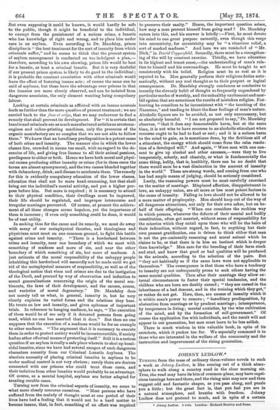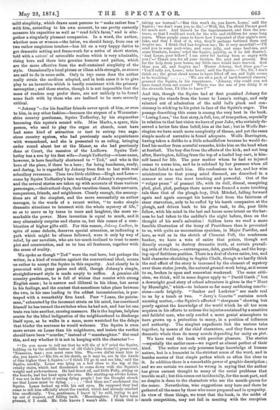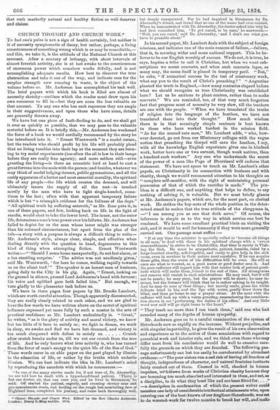JOHNNY LUDLOW.* TURNING from the mass of ordinary three-volume novels
to such a work as Johnny Ludlow, is like coming out of a thick atmo- sphere to walk along a country road in the clear morning air. True, the road may have its bits of common-place, may have capri- cious turnings here and there, and the rising mist may now and then suggest odd and fantastic shapes, as you pass along, and puzzle you a little ; but the great fact is, that you feel you are in a natural atmosphere, and breathe with freedom. Johnny Ludlow does not pretend to much, and in spite of a certain
• Johnny Lucilow. 8 vols. London: Richard Bentley and Bons.
mild simplicity, which draws most persons to "wake rather free" with him, according to his own account, he can pretty correctly measure his capacities as well as "read folk's faces," and is alto- gether a singularly pleasant companion. In a word, the author, whether man or woman—the latter, we should fancy, from one or two rather suspicious touches—has hit on a very happy device to
get dramatic setting and framework for a series of short stories, told with a naivete of ostensible realism which is very admirable,
rising here and there into genuine humour and pathos, which are the more effective from the well-sustained simplicity of the style. Occasionally a local phrase or idiom adds strength, as stones are said to do in some soils. Only in two cases does the author really strain the medium adopted, and in both cases it is to give play to an invention which is hardly consistent with the primary assumption ; and these stories, though it is not impossible that the mass of readers may prefer them, are not unlikely to be found some fault with by those who are inclined to be more severely critical.
"Johnny "—for his familiar friends never speak of him, or even to him, in any other fashion—becomes the stepson of a Worcester- shire country gentleman, Squire Todhetley, by his stepmother
becoming this squire's second wife. Miss Marks, a spare, thin person, who used to play the organ at church, must have -had some kind of attraction or tact to entrap two saga- cious country squires, who had previously made acquaintance with womanhood, and she is presented to us ruling, bringing order round about her at the Manor, as she had previously done at Court, the mansion of the Ludlows. Squire Tod- hetley has a son by his first wife—JosephTodhetley—whose name, however, is here familiarly shortened to "Tod," and who is the hero of the piece, if there be a hero ; for being handsome, ready, and daring, he is regarded by Johnny from first to last with real schoolboy reverence. Then two little children—Hugh and Lena—
come by Squire Todhetley's late wedding of Johnny's stepmother, and the several stories are taken up with accounts of these various personages,—their school-days, their vacation-times, their servants, companions, friend; and neighbours. Clearly enough, the assump- tions are of the simplest, and the more successfully an author manages, in the words of a recent writer, "to make simple dramatic situations to intersect with the whole mystery of life,"
so as to move us by turns to tears and laughter, the more re- markable the power. Mere invention is equal to much, and it may alternately surprise and charm us, but this comes of a com- bination of higher gifts still. For this reason, Johnny Ludlow, in
spite of some defects, deserves special attention, as indicating a path which might be oftener followed, were it only by way of relief, by our novelists, who are too much inclined to trust to were plot and construction, and so to lose all freshness, together with the sense of reality.
We spoke as though " Tod " were the real hero, but perhaps the writer, in a kind of reaction against the conventional ideal, means ,us rather to accept the Squire in this capacity. And clearly he is presented with great pains and skill, though Johnny's simple,
straightforward style is made amply to suffice. A genuine old country gentleman, he is full of whims that consist with strong English sense ; he is narrow and illiberal in his ideas, but never in his feelings, and the contest that sometimes takes place between the two, in his case leading to the oddest inconsistencies, is por- trayed with a remarkably firm hand. Poor "Lease, the points- man," exhausted by the incessant strain on his mind, has convinced himself he has turned the switches when he had not, and has let one train run into another, causing massacre. He is the hapless, helpless centre for the blind indignation of the neighbourhood to discharge itself upon, as he walks in a maze, more wretched for the delays that hinder the sentence he would welcome. The Squire is even more severe on Lease than his neighbours, and insists the verdict should have been "murder," instead of "manslaughter." But read this, and say whether it is not in keeping with the character ?—
‘" Do you mean to tell me that he will die of it ?' cried the Squire, holding on by the middle button of old Cole's [the doctor's] great-coat, 4Nonsense, man ; you must cure him. We,—we did'nt want him to die, you know.'—' His life or his death, as it may be, are in the hands of One higher than I, Squire.'—' I think I'll go in and see him,' said the Squire, meekly. Lease was lying on a bed close to the top of the creaky stairs, which had threatened to come down with the Squire's 'weight and awkwardness. He had dozed off, and little Polly, Bitting on the boards, had her head upon his arm. Her starting-up awoke Lease. I was not in the habit of seeing dying people ! but the thought struck me that Lease must be dying God bless me !' exclaimed the Squire. Lease looked up with his sad eyes. He supposed they had come to tell him officially about the verdict, which had already reached him unofficially. 'Yes, gentlemen, I know it,' ho said, trying to get up out of respect, and falling back. 'Manslaughter. I'd have been present, if I could. Mr. Cole knows I wasn't able. I think God, is taking me instead.'—' But this won't do, you know, Lease,' said the Squire; 'we don't want you to die.'—' Well, Sir, I'm afraid I'm not good for much now. And there'd bo the imprisonment, and then the sen- tence, so that I could not work for the wife and children for some long years. When people come to know bow I repented of that night's mis- take, and that I died of it, why, they'll perhaps befriend them and forgive me. I think God has forgiven me; He is very merciful!---, I'll send you in some port-wine, and some jelly, and some beef-tea, and some blankets, Lease,' cried the Squire, quickly, as if he felt flurried. 'And Lease, poor follow ! I am sorry for having been so angry with you!'—' Thank you for all your favours, Sir, past and present. But for the help from your house, my little ones would have starved. God bless you all, and forgive me I Master Johnny, God bless you 1'— 'You'll rally yet, Lease ; take heart,' said the Squire.—' No, Sir, I don't think so; the great cloud seems to have lifted off me, and light seems to be breaking' We are all a pack of hard-hearted sinners,' groaned the Squire, in his repentance. 'Johnny, why could you not have found them out sooner? Whore was the uso of you doing it at the eleventh hour, I'd like to know ?'"
And this, though the Squire had at first punished Johnny for carrying the viands from the house to Lease's cottage, and only relented out of admiration of the mild lad's pluck and con- sistency in sticking to his point in face of the Squire's anger. The passage describing this scene is among the very best in the book. "Losing Lena," the first story, is full, too, of true pathos, especially in relation to that last vision we have of poor Jake, who certainly de- served a better fate than befell, him at the last ; but in Wolfe Bar- rington we have much more complexity of theme, and yet the same simple mode of narrative is found adequate. Wolfe Barrington,
having taken a dislike to a little schoolfellow because he would de- fend his mother from scornful remarks, kicks him on the head when at football. The boy dies from the effects of the kick, and not long after, Barrington, falling from the top of a loaded hay-cart, is him-
self lamed for life. The poor mother whom he had so injured comes to nurse him, and he is subdued by her presence when all else had failed to melt him. His confessions to her, and her wise ministrations to that young mind diseased, are described in a manner at once the most touching and powerful. Out of the " vulgar prose" of peasant life, with its dull, dismal, unaspiring plod, plod, plod, perhaps there never was framed a more touching tale than that of the plough-boy, Dick Mitchel, falling forward again and again amongst his horses' feet from the faintness of sheer starvation, only to be cuffed by his harsh companion at the plough, and driven back to his grim task, to die, poor little fellow, with his mind in the last sad hours more intent on the har- ness he had taken to the saddler's the night before, than on the thought of his soul's salvation ! Seldom have we read a more forcible illustration of the irony of Providence than is presented to us, with quite an unconscious cynicism, in Major Parrifer, and here, as well as in the sketch of Clement Pell, the mushroom banker, we have a vein of satire that points, though not directly enough to destroy dramatic truth, at certain prevail- ing evils of the time,—extravagance, debt, gambling, and the keep- ing-up of fictitious position. There is a deal of clever satire, too, and bold character-sketching in Sophie Chalk, though we hardly think the real effect of the story is increased by the element of mystery over those stolen jewels, the natural ground-work being, as it seems to us, broken in upon and somewhat weakened. The same criti- cism, we think, will in some degree apply to "David Garth ;" but a downright good story of school adventure is given in the "Hunt by Moonlight," which—to balance so far many saddening conclu- sions—ends brightly. " Sanker and Lacketer " are made real to us by a touch or two. "Jerry's Gazette" contains much amusing matter,—the Squire's affected " sharpness " showing but poorly against the knowledge of the world which he all too soon acquires in his efforts to redress the injuries sustained by a sensitive and faithful man, who only needed a more genial atmosphere to have grown up a protection to many, in a position of influence and authority. The simplest expedients link the various tales together, by means of the chief characters, and they form a truer dramatic whole than do many novels depending for unity on plot.
We have read the book with peculiar pleasure. The stories —especially the earlier ones—we regard as almost perfect of their kind. The writer not only possesses large knowledge of human nature, but is a humorist in the strictest sense of the word, and is besides master of that simple pathos which so often lies close to it. In addition there is a remarkable power of graphic description ; and we are certain we cannot be wrong in saying that the author has given earnest thought to many of the social problems that trouble us all ; but this comes out incidentally, for the most part, and no despite is done to the characters who are the mouth-pieces for the nonce. Nevertheless, wise suggestions may here and there be gathered all the same by those who come prepared and in sympathy.
In view of these things, we trust that the book, in the midst of much competition, may not fail in meeting with the reception that such markedly natural and healthy fiction so well deserves and claims.




































 Previous page
Previous page